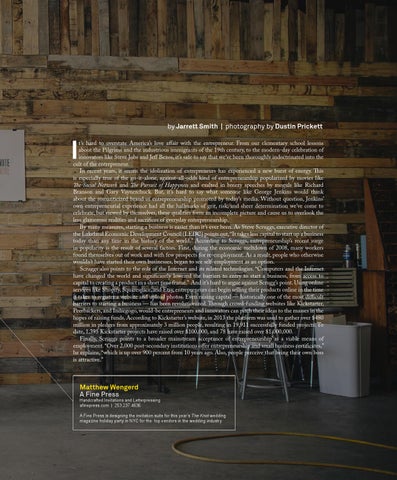by Jarrett Smith | photography by Dustin Prickett
I
t’s hard to overstate America’s love affair with the entrepreneur. From our elementary school lessons about the Pilgrims and the industrious immigrants of the 19th century, to the modern-day celebration of innovators like Steve Jobs and Jeff Bezos, it’s safe to say that we’ve been thoroughly indoctrinated into the cult of the entrepreneur. In recent years, it seems the idolization of entrepreneurs has experienced a new burst of energy. This is especially true of the go-it-alone, against-all-odds kind of entrepreneurship popularized by movies like The Social Network and The Pursuit of Happyness and exalted in breezy speeches by moguls like Richard Branson and Gary Vaynerchuck. But, it’s hard to say what someone like George Jenkins would think about the romanticized brand of entrepreneurship promoted by today’s media. Without question, Jenkins’ own entrepreneurial experience had all the hallmarks of grit, risk, and sheer determination we’ve come to celebrate, but viewed by themselves, these qualities form an incomplete picture and cause us to overlook the less glamorous realities and sacrifices of everyday entrepreneurship. By many measures, starting a business is easier than it’s ever been. As Steve Scruggs, executive director of the Lakeland Economic Development Council (LEDC) points out, “It takes less capital to start up a business today than any time in the history of the world.” According to Scruggs, entrepreneurship’s recent surge in popularity is the result of several factors. First, during the economic meltdown of 2008, many workers found themselves out of work and with few prospects for re-employment. As a result, people who otherwise wouldn’t have started their own businesses, began to see self-employment as an option. Scruggs also points to the role of the Internet and its related technologies. “Computers and the Internet have changed the world and significantly lowered the barriers to entry to start a business, from access to capital to creating a product in a short time frame.” And it’s hard to argue against Scrugg’s point. Using online services like Shopify, Squarespace, and Etsy, entrepreneurs can begin selling their products online in the time it takes to register a website and upload photos. Even raising capital — historically one of the most difficult barriers to starting a business — has been revolutionized. Through crowd-funding websites like Kickstarter, Peerbackers, and Indiegogo, would-be entrepreneurs and innovators can pitch their ideas to the masses in the hopes of raising funds. According to Kickstarter’s website, in 2013 the platform was used to gather over $480 million in pledges from approximately 3 million people, resulting in 19,911 successfully funded projects. To date, 1,395 Kickstarter projects have raised over $100,000, and 78 have raised over $1,000,000. Finally, Scruggs points to a broader mainstream acceptance of entrepreneurship as a viable means of employment. “Over 2,000 post-secondary institutions offer entrepreneurship and small business certificates,” he explains, “which is up over 900 percent from 10 years ago. Also, people perceive that being their own boss is attractive.”
Matthew Wengerd A Fine Press
Handcrafted Invitations and Letterpressing afinepress.com | 253.237.4636 A Fine Press is designing the invitation suite for this year’s The Knot wedding magazine holiday party in NYC for the top vendors in the wedding industry.
THE LAKELANDER
77
